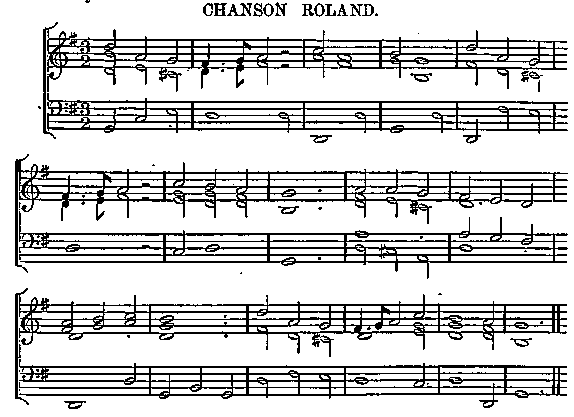Popular Music Of The Olden Time Vol 1
Ancient Songs, Ballads, & Dance Tunes, Sheet Music & Lyrics - online book
| Share page | Visit Us On FB |
|
NORMANS.—BATTLE OF HASTINGS. |
7 |
|||
|
Robert Wace, in the Roman de Rou, says that Taillefer sang with a loud voice (chanta a haute voix) the songs of Qharlemagne, Roland, &c, and M. de Toulmon considers the song of Roland to have been a Chanson de Geste, or metrical romance; and that Taillefer merely declaimed parts of such poems, holding up those heroes as models to the assembled soldiers. The Chanson de Roland, that was printed in Paris in 1837-8 (edited by M. Michel) from a copy in the Bodleian Library, is a metrical romance in praise of the French hero, the Orlando Innamorato, and Furioso of Boiardo, Berni, and Ariosto, but apparently of no such antiquity,* and it seems improbable that he should have been the subject of the Norman minstrel's song. All metrical romances, however, were originally recited or chanted with an accompaniment; and Dr. Crotch has printed a tune in the third edition of his Specimens,of Various Styles of Music, vol. 1. p. 133, as the " Chanson Roland sung by the Normans as they advanced to the battle of Hastings, 1066," which I give as a curiosity, but without vouching for its authenticity. |
||||
|
|
||||
 |
||||
|
|
||||
|
Dr. Crotch does not name the source from which ho obtained this air, nor have I been successful in tracing it.b The story of Taillefer may, however, be altogether apochryphal, as it is not mentioned by any contemporary historian.
The English, according to Fordun, spent the night preceding the battle in |
||||
|
|
||||
|
■It contains, also, about 4,000 verses ; and it seems still more improbable that so lengthy a compoiition should have been generally and popularly known. It is more likely to have originated in the favor with which an earlier song was received.
b The Chanson de Roland that has been printed re- |
cently, edited by Sir Henry Bishop, ia a Composition by the Marquis de Paulmy, taken from Burney's History of Music, vol ii. p. 276, but Dr. Burney does not give it as an ancient song or tune. The tune, indeed, is not even in imitation of antiquity. ' |
|||